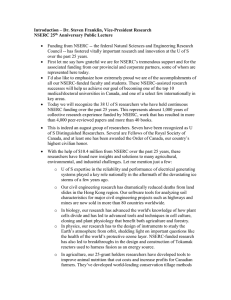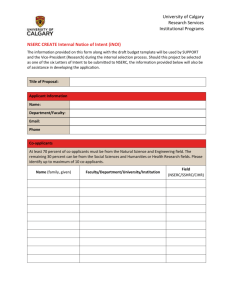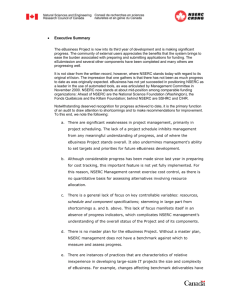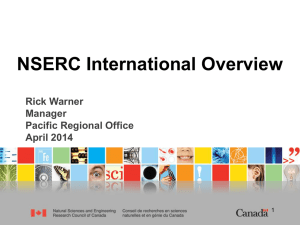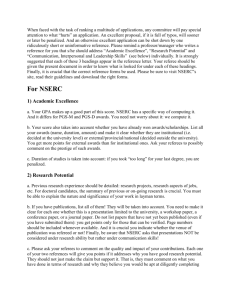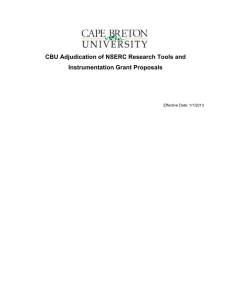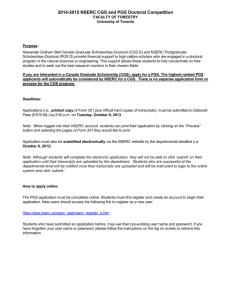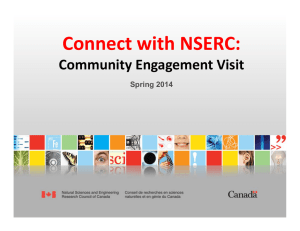Clarifying NSERC`s Position on Subject Matter Eligibility NSERC, in
advertisement
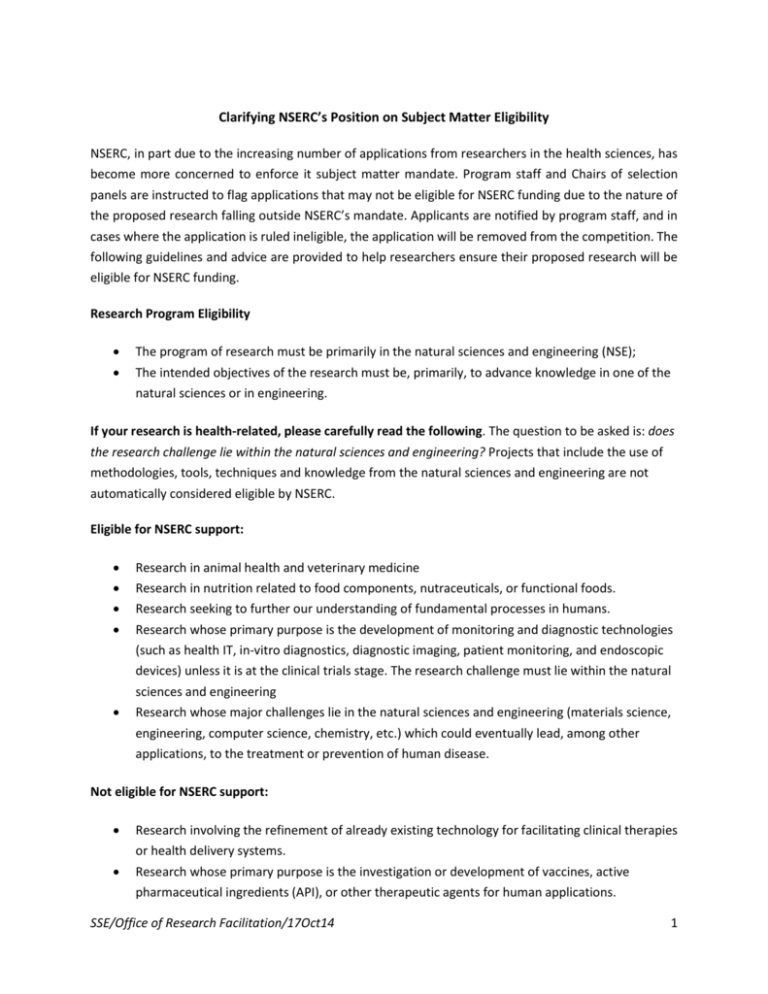
Clarifying NSERC’s Position on Subject Matter Eligibility NSERC, in part due to the increasing number of applications from researchers in the health sciences, has become more concerned to enforce it subject matter mandate. Program staff and Chairs of selection panels are instructed to flag applications that may not be eligible for NSERC funding due to the nature of the proposed research falling outside NSERC’s mandate. Applicants are notified by program staff, and in cases where the application is ruled ineligible, the application will be removed from the competition. The following guidelines and advice are provided to help researchers ensure their proposed research will be eligible for NSERC funding. Research Program Eligibility The program of research must be primarily in the natural sciences and engineering (NSE); The intended objectives of the research must be, primarily, to advance knowledge in one of the natural sciences or in engineering. If your research is health-related, please carefully read the following. The question to be asked is: does the research challenge lie within the natural sciences and engineering? Projects that include the use of methodologies, tools, techniques and knowledge from the natural sciences and engineering are not automatically considered eligible by NSERC. Eligible for NSERC support: Research in animal health and veterinary medicine Research in nutrition related to food components, nutraceuticals, or functional foods. Research seeking to further our understanding of fundamental processes in humans. Research whose primary purpose is the development of monitoring and diagnostic technologies (such as health IT, in-vitro diagnostics, diagnostic imaging, patient monitoring, and endoscopic devices) unless it is at the clinical trials stage. The research challenge must lie within the natural sciences and engineering Research whose major challenges lie in the natural sciences and engineering (materials science, engineering, computer science, chemistry, etc.) which could eventually lead, among other applications, to the treatment or prevention of human disease. Not eligible for NSERC support: Research involving the refinement of already existing technology for facilitating clinical therapies or health delivery systems. Research whose primary purpose is the investigation or development of vaccines, active pharmaceutical ingredients (API), or other therapeutic agents for human applications. SSE/Office of Research Facilitation/17Oct14 1 Research whose primary purpose is the investigation/treatment of injuries or human performance. Research seeking to develop animal models of human diseases in order to study primarily the disease state, or treatments for injuries or diseases represented by the model. Applied research for disease treatment, diagnosis or prevention Research involving clinical trials. NSERC does not support clinically-oriented research. Additional tips: Consider the potential for knowledge translation to other industries - where possible, identify other fields or industries where your research advances might also be applied. Ensure your research questions are strongly worded and focused around NSE, and that the research program employs NSE approaches. Use the exact wording from the list of topics that are eligible for NSERC support (above). It is appropriate to use data from studies using humans to validate a model, but studies that focus on human subjects will be harder to justify to NSERC (as above, NSERC does not support clinically-oriented research). Fundamental processes of humans can include aging. Ensure that the novelty and innovative nature of your research program is still clear – highlight what is new and different. Motivate the research program based on the aspects that are eligible within the eligible NSERC subject matter areas. For program objectives, make sure to keep these relating to NSE oriented questions. Objectives can build upon each other, or be linked. Relevance and significance can outline application to injury or disease in future application. DG application will be strengthened if there are additional areas for NSE based outcomes identified such as materials for other industry sectors, new analytical approaches to be utilized by other sectors etc. “relation to other research” section can be used to highlight how the proposed research fits with your other ongoing research, but is distinct and different in focus (i.e. no overlap). For more information see Selecting the Appropriate Federal Granting Agency. SSE/Office of Research Facilitation/17Oct14 2
